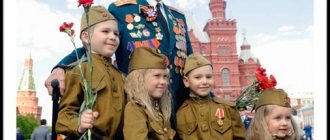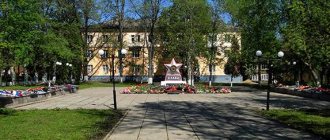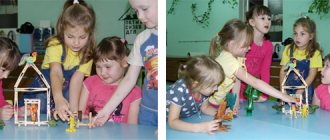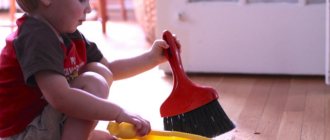Even the most tragic event can be forgotten. This is what happens with the Great Patriotic War - fewer and fewer people who went through wartime remain alive. Veterans are leaving. Facts and dates are erased from the memory of young people, and teenagers often don’t even know the basics: who fought with whom and why. But one wise front-line teacher once said: “ Children! Remember! As soon as you forget this war, immediately expect a new one! " That’s why stories about war are so important for children, and you can introduce your child to the history of a global catastrophe from a very early age.
Make sure your baby is okay while you're away. Install the “Where are my children” application to always know where your child is, what is happening around him, and how he is feeling.
Content:
- How to tell children about the Great Patriotic War Why tell children about the war
- Where to start a conversation Why the war started
- Military professions
- For preschoolers
How to tell children about the Great Patriotic War
The main advice: when discussing war, do not use words from a textbook. Children remember small details, unusual facts and features better. Tell the story of the Second World War as an event in which real people with different, albeit similar, destinies took part.
Why tell children about war?
Sometimes parents and other adults are in no hurry to tell their children about the war, fearing that the child will be traumatized by the tragedy of the story. But children perceive stories about the Second World War quite calmly; the main thing is to choose the right presentation. Every child needs to know about the Great Patriotic War: while we pass on the memory of Soviet soldiers from generation to generation, children continue to honor the feat of their grandfathers and great-grandfathers. This means that the heroes did not shed their blood in vain.
Where to start a conversation
When starting a conversation about war, of course, it is necessary to take into account the age of the child. A child under five years old is unlikely to be ready for a very serious topic. But children over five years old already have a well-developed concept of justice: at this age, the child clearly understands “what is good and what is bad,” and therefore will be able to correctly evaluate the events retold by an adult. The only thing you should avoid in conversations about the Second World War with preschoolers and primary schoolchildren is overly dramatic descriptions of the dead and wounded.
You can start a conversation about war using the example of a relative who fought. If there is no such relative, briefly describe in simple words why the war started.
Why did the war start
It is necessary to tell your child why the war started. But the story may be different for different ages. For younger children, it is enough to explain the reasons for the war in general terms: how one country wanted to seize the territories of other countries and how the leaders of different states quarreled among themselves.
Schoolchildren can be presented with a more detailed and honest version of events: that the German fascists under the leadership of Hitler - one of the most cruel people in the entire existence of mankind - decided to kill other people because these people were of a different nationality. In the conversation, it will be useful to mention that in Germany itself there were people of different nationalities who were primarily affected by fascist persecution.
How to talk about war and what to talk about
When talking about the war with children of any age, answer all the questions that young listeners have. Even if you don’t know the answer, it’s not a big deal; you can find all the necessary information in additional sources. To better understand the topic, mention in your conversation about the children who lived during the Great Patriotic War and participated in the defense of their Motherland.
What exactly to tell children about in a conversation about the Second World War - an approximate brief plan:
- the treacherous attack of fascist Germany on the Soviet Union (here it can be explained that previously Russia was not a separate country, but was part of the Union along with other republics) on June 22, 1941 at 4 a.m.;
- heroic defense of the Brest Fortress - June 22-July 20, 1941: the fortress was defended by 4,000 people;
- Battle of Moscow - October 1941-April 1942: one of the turning points of the Second World War;
- Siege of Leningrad (modern St. Petersburg) - September 8, 1941-January 27, 1944: it was possible to break through the blockade ring only after 872 days;
- Battle of Kursk - July 5-August 23: the most fierce battle of the entire war, the result of the battle was the destruction of the two main fascist groups;
- Battle of Stalingrad - July 17, 1942-February 2, 1943: after a battle that lasted 200 days, it became clear that the defeat of Germany by Soviet soldiers was a matter of time;
- capture of Berlin - April 1945: Soviet soldiers reached the German capital, simultaneously liberating other European countries captured by the Nazis;
- Victory Day - May 9, 1945: the day before, late in the evening, the final Act of unconditional surrender of Nazi Germany and its armed forces was signed.
You can talk about the main milestones of the war briefly or in more detail - depending on the age of the children. If the children are carried away by the conversation, end the conversation with questions on the topic. For example, like this:
- When did the Great Patriotic War begin?
- Which country attacked the Soviet Union?
- Who are the fascists?
- Who won the war?
- How long did the Second World War last?
- What holiday do we celebrate on May 9?
Reinforce the discussion of the war visually: show children photographs from the Great Patriotic War.
What else should you tell children about in a conversation about the Second World War - recommendations from teachers:
Military professions
Explain to the children that, in addition to the well-known and familiar professions (teacher, doctor, builder), there are also special professions - the military. A person who has chosen a military profession may be able to develop combat tactics, design military equipment, master weapons, and be able to provide first aid. Examples of military professions: sailors, pilots, signalmen, medical workers.
In a conversation about military professions, talk about how difficult it was for those who remained in the rear. Women, children, and elderly people worked almost without rest to make life easier for those who fought: they created military equipment in factories, grew food for Soviet soldiers, and sewed uniforms.
Hero Cities
Tell your child that hero city is a very honorable title, and those cities whose residents showed special heroism and courage were awarded this title. Nowadays, when the USSR no longer exists, hero cities are located on the territory of Russia, Ukraine, Belarus:
- Brest - almost all its residents took part in the defense of the city;
- Odessa - the defenders of Odessa were the first to begin a subversive war against the Nazis: they made their way into the city at night to disable equipment and blow up houses occupied by the invaders;
- Leningrad - the residents of modern St. Petersburg had a particularly hard time: the Nazis did not allow convoys with food and medicine into the city, deliberately broke the heating system, and for more than two years the residents of besieged Leningrad were malnourished and freezing, but did not surrender the city to the enemy;
- Kyiv - the city was occupied for 778 days, during which time the Germans almost completely destroyed the city;
- Sevastopol, a city near the Black Sea, Hitler planned to capture in the very first days of the war, but the city’s residents managed to hold their defense for 8 months;
- Murmansk has experienced a huge number of attacks, more than 180 thousand bombs were dropped on the city, partially destroying it. But Murmansk did not give up, its residents continued to work and defend themselves;
- Tula - from October to December the population heroically defended their hometown;
- Minsk - after three years of occupation, almost nothing was left of the city, and after the war Minsk was rebuilt;
- Novorossiysk - the city defended itself for 225 days, the battles ended with the complete liberation of Novorossiysk;
- Kerch - the city spent 700 days under occupation, its residents suffered more than others from the fascist invaders;
- Volgograd (Stalingrad) was one of Hitler’s main goals, but the Nazis failed to break through the defenses, and after 200 days the Germans themselves were captured by Soviet soldiers;
- Moscow - on the approaches to the capital of the USSR, German troops suffered their first major defeat.
Awards
Special awards were created for WWII participants, and they were presented to heroes of any rank: commanders of detachments and divisions, ordinary soldiers, doctors, child heroes. Examples of WWII awards:
- Orders of Suvorov, Kutuzov, “Red Banner”;
- medals “For Military Merit”, “For Courage”;
- awards for the defense of hero cities.
How to tell your child about Victory Day
You can awaken a child’s interest in the holiday with a simple question: “Do you know what holiday is tomorrow?” Children love holidays, and the child will probably start asking leading questions.
Usually, children first hear about Victory Day early - at 3-4 years old. Considering the age of the baby, do not drag out the story and do not overload the conversation with details. For example, a conversation can be structured like this: “When your great-grandfather was as little as you are now, our country was attacked by very evil people - the Nazis. But our soldiers managed to defend their native land and defeat the invaders, and Victory Day fell on May 9, 1945. Since then, we have celebrated this holiday every year, remembering everyone who fought for victory.”
The story can be supplemented by viewing children's themed books with large photos and images dedicated to the Second World War and Victory Day.
How to tell your child about Victory Day
Children perceive any event through a certain visual sequence. They associate Victory Day, first of all, with fireworks, marches, displays of equipment and soldiers' porridge. For them, this is something like a matinee, when they rehearse a marching step together, and then, dressed up, they walk in a group or class down the street. The echoes of the Great Patriotic War echo back to us, but for our children this is already a kind of story about how their great-grandfather went against the Germans. On the one hand, it is a little sad, but on the other hand, it is great happiness that we know about the war only by hearsay.
Quick registration Get 5% discount on your first order! Unfortunately, due to the self-isolation regime, no one will march, which means that adults are faced with a new task: to explain to the younger generation what Victory Day is. We offer a few simple steps to help create a festive atmosphere at home.
Step #1.
Decorate the house
Find a time when both you and your child are not busy with anything else, and start decorating the house in honor of Victory Day. The All-Russian event “Windows of Victory” is currently underway: this is a wonderful opportunity to honor the memory of all soldiers and feel the mood of the holiday. Prepare templates in advance (the Internet provides a lot of options) and a soap solution to glue the figures to the glass. This activity can captivate you for the whole day, and you won’t get bored. If you have good artistic abilities, then use paints - the drawing will turn out bright and vibrant.
Step #2.
Talk about the Great Patriotic War
While you and your child are decorating the house, share what you know about the war and Victory Day. Your story should not be a dry report, like from the “Soviet Information Bureau”, but rather a story or even a fairy tale. If the children are very young, then you should not bombard them with complex words “German fascist invaders”, “occupation”, “blockade” - the simpler the better. The text could be like this:
“Do you know what holiday we are preparing for? Our entire huge country will celebrate Victory Day on May 9. This is a very big holiday. Once upon a time, when neither you, nor my dad and I, nor even my grandparents existed, a war began in our Motherland. It lasted a very long time: 4 summers, 4 autumns, 4 winters and 4 springs. The fascists (these are enemies) wanted to seize our lands. They sent us thousands of angry soldiers with guns shooting sharp bullets, hundreds of huge tanks and the same number of planes roaring like thunder in the rain. Our great-grandmothers and great-grandfathers did not want to give up and live according to the rules of the enemy. The entire huge country stood up to defend its borders. That’s why we say “The Great Patriotic War,” because everyone, everyone, everyone (both men and women) fought the Nazis. Great-grandfathers were brave warriors, and great-grandmothers were nurses and helped the wounded. And so, after 4 summers, 4 autumns, 4 winters and 4 springs, our soldiers won a victory and drove out the enemy. But many died in that war. In honor of the heroes who fought the Nazis, monuments were erected throughout our vast country. And every year, on May 9, we congratulate each other on victory in the Great Patriotic War. We remember our veterans - these are experienced soldiers who saved their Motherland. We remember and are proud of the warriors who fought without fear for all of us: for our grandparents, for our mothers and fathers, for our children and their future. On Victory Day, we always rejoice in the fact that for many years planes have not flown in the sky, roaring like thunder in the rain, and huge tanks have not been driving along the ground. And we say to our veterans: “Thank you for the peaceful sky above your heads!”
The story, of course, is adapted to the age of the children, and no one can cancel the parents’ imagination. You can use information from books or the Internet.
Step #3.
View photos
Looking through family albums will help you feel the holiday spirit. Tell the child about his ancestor, show photographs, letters from the front, awards, some personal items, if any have survived. Remember how you celebrated Victory Day as a child, share your emotions.
Step #4.
Go on an excursion
Of course, this is physically impossible now, but thanks to various resources you can take a virtual tour. For example, the popular website “My Family in the History of the Great Victory” offers tours of museums and exhibition halls and 3D panoramas of wartime in a virtual teaching room. The tour will be interesting not only for children, but also for adults.
Step #5.
Craft, draw, play
Children over 5 years old will definitely be interested in encyclopedias. Boys will be fascinated by books about military equipment, weapons, and military ranks. Look at the illustrations together, read the descriptions and characteristics of the combat vehicles. Offer to make a craft or drawing. As a rule, all boys can and love to draw tanks. The main thing is not to limit the flight of imagination. Let the child draw as he feels, even if you know that there were no laser guns in 1941.
Girls can be told about the heroism of nurses and doctors. If you have a doctor's set, this would be a great option for the game. Get dad involved, let him pretend to be a wounded soldier, and let his daughter become a caring nurse. For older preschoolers, set up a small field kitchen. This year we will have to limit ourselves to personal square meters, but it’s better than nothing. Cook soldier’s porridge with your children and make tea. To better feel the military spirit, try making a tent from sheets, chairs and scrap materials (maybe you have a ready-made one) and move your meals there. And if you also find iron utensils, it will turn out very atmospheric.
Step #6.
Organize a search for information
Nowadays you can find almost any information on the Internet. Set yourself the goal of collecting all kinds of data on your relatives who participated in the war. If you haven’t had the opportunity to arrange everything before, now is the time. Make a special album or carefully put documents in a folder, involve the children in this activity, let them decorate, for example, the cover with prepared stickers. This activity will be better than any board games. Along the way, you can talk about Victory Day; you will definitely remember some family stories.
Step #7.
Read literature
It’s better to read poetry with kids. If desired, learn a small and understandable piece of work.
12 poems about war for kids
- 1. S. Mikhalkov “No War” 2. T. Belozerov “Victory Day” 3. A. Usachev “What is Victory Day” 4. S. Pivovarov “Old Photo” 5. A. Surkov “The beauty that nature gives us » 6. A. Vladimirov “To Women Warriors” 7. V. Stepanov “A Veteran’s Story” 8. A. Barto “In the Days of War” 9. N. Tomilina “Victory Day” 10. A. Tvardovsky “A Tankman’s Story” 11. V. Stepanov “Friends Come to Grandfather” 12. P. Voronko “Victory Day”
If you have children over 5-6 years old, then choose a short story. After reading, be sure to ask your child what he liked about the work, which characters he remembered, what he felt and imagined. Thus, children will not only get a little touch on that distant time, but will also expand their vocabulary and develop coherent speech skills.
10 war stories for children
The most relevant and useful information for modern parents is in our newsletter. We already have over 30,000 subscribers!
- 1. S. Alekseev “Victory will be ours!” 2. A. Platonov “Little Soldier” 3. K. Paustovsky “Steel Ring” 4. S. Georgievskaya “Galina’s Mom” 5. V. Dragunsky “Watermelon Lane” 6. V. Oseeva “Andreyka” 7. G. Cherkashina “ Doll" 8. A. Mityaev "Bag of Oatmeal" 9. A. Gaidar "Hike" 10. G. Abrahamyan "An Incident at the Crossing"
Step #8.
Listen to songs of the war years
You can turn them on in the background when you decorate the house, make some crafts with your children, or paint. If the child is artistic, then learn one of your favorite songs together and record the performance on video. If you wish, you can take part in a military song competition. Or simply please your family and friends with your creativity.
Step #9.
Watch themed cartoons
Old Soviet cartoons and modern short films are freely available online. Choose the one you like and watch it together. First, watch the cartoon yourself and evaluate whether it is suitable for your child’s age. Afterwards, talk about the plot, offer to make a drawing for the cartoon.
10 cartoons about war for children
- 1. “A Soldier’s Tale” 2. “The Legend of the Old Lighthouse” 3. “Cornflower” 4. “Memory” 5. “Soldier’s Lamp” 6. “Fireworks” 7. “The Adventures of Red Ties” 8. “Strong in spirit are stronger than walls” 9. “Pioneer Violin” 10. “Live”
With younger students, watch a movie about wartime and patriotism.
15 films about war for children
- 1. “Son of the regiment” 2. “Sit down next to me, Mishka!” 3. “Four tankmen and a dog” 4. “A girl is looking for her father” 5. “Boys” 6. “Kingfisher” 7. “Oginsky’s Polonaise” 8. “Five Braves” 9. “A bullet is afraid of the brave, or Mishka takes the fight” 10 "Alexander Little" 11. "Vasyok Trubachev and his comrades", "Trubachev's detachment is fighting" 12. "The Tale of Malchish-Kibalchish" 13. "Officers" 14. "Once upon a time there was a girl" 15. "Soldier"
Step #10.
Arrange a holiday
Self-isolation is not a reason to wear pajamas all day, especially on Victory Day. Dress in smart clothes, don’t forget about the St. George’s Ribbons, and prepare a festive lunch. Call your family to congratulate them. If possible, buy or sew front-line clothing for the children in advance and arrange a themed photo shoot. Select several photos and design them using simple postcard editors. It might even become a tradition for your family. Watch a recording of last year's parade and fireworks on Red Square. Such holiday symbols are very important for children.
At the end of the evening, be sure to talk to your child about everything you did. Consider whether it is dangerous to be a soldier, what war is, why we celebrate May 9, and remind us once again how important it is to honor the memory of soldiers.
Quick registration Get 5% discount on your first order!
How do you celebrate Victory Day in your family? Share this or other family traditions in our group “Become a Lucky Child Blog Author!”
Life and exploits of children during the Second World War
“War does not have a woman’s face,” that’s what writer Svetlana Alexievich called her book. We can safely add that the face of war should not be childish: and in 1941, children who were barely 10 years old defended their Motherland on an equal basis with adults.
Tell your child about his peers who lost their childhood: in the lives of these boys and girls there were no fairy tales, cartoons, or even parental care. Often a child is sincerely imbued with a story when its participants turn out to be children like himself.
Boys and girls got to the front in different ways. Sometimes their parents took them with them, suggesting that staying at home was even more dangerous, sometimes soldiers picked up children lost during battles. But more often than not, the guys themselves wanted to get to the front, and simply ran away from home to the front line, and the commanders had no choice but to accept the young soldier into their ranks.
Three stories about children of the Great Patriotic War, whose courageous deeds will forever remain in the history of Russia:
Marat Kazei, 14 years old
Monument to Marat Kazei, Minsk, 1984. Photo: Antonio3.14. Source
By the beginning of the war, Marat had only completed elementary school. Even before the war, the boy’s parents were declared “enemies of the people” (then, before the war, many innocent people suffered from false accusations), only the mother was left alive. Marat’s mother forgave the Soviet authorities for the unfair accusations, and during the war she hid partisans in her home, for which she was hanged by the Nazis.
Then Marat himself joined the partisans and carried out activities on a par with his adult comrades: he blew up enemy trains, went on reconnaissance and participated in dangerous raids. A year before the Victory, Marat Kazei died, blowing up both himself and the fascists attacking him with a grenade.
Serezha Aleshkov, 6 years old
One of the youngest combatants. A little boy got lost in the forest, escaping with partisans from a village captured by the Germans, and was picked up by scouts of the 142nd Guards Regiment.
Due to his age, Seryozha did not participate in battles, but he helped in every way he could: he delivered mail and food, and brought shells. And one day a boy saved the regiment commander while clearing away the rubble of the dugout where the commander ended up. After the war, Seryozha was adopted by Major Mikhail Vorobyov, who also fought in the 142nd Guards Regiment.
Zina Portnova, 17 years old
The young partisan joined the underground organization “Young Avengers”. Zina managed to get a job as a dishwasher in a German canteen, where she poisoned the food, killing more than a hundred fascists.
In 1943, the girl was captured and brutally tortured, but she did not surrender to her family. During one of their interrogations, Zina shot three Germans with a stolen pistol. In 1944, Zina Portnova was shot without obtaining the necessary information from her.
The children who remained in the rear also performed feats - only labor ones: they worked day and night in factories to provide the army with everything they needed, sewed and knitted clothes, and made dishes.
Long and short poems for a recitation competition for Victory Day (for school and kindergarten)
Our generation should not forget about those battles when the Great Patriotic War of 1941-1945 was fought, remember these dates. We must learn not to repeat such mistakes of fate, but at the same time always remember the exploits and those people who fought for our Motherland. Our Mother Rus' has more than once held the defense in its direction, appreciate the peacetime, it has come to us with huge losses and a lot of victims.
Thank God that the war is over and only these phrases and sentences remind us of these events of those years.
What is Victory Day? This is the morning parade: Tanks and missiles are driving, a line of soldiers is marching. What is Victory Day? This is a festive fireworks display: Fireworks fly into the sky, scattering here and there. What is Victory Day? These are songs at the table, These are speeches and conversations, This is grandfather's album. These are fruits and sweets, These are the smells of spring... What is Victory Day - This means - no war. (A. Usachev)
***************************************
One day the children went to bed - the windows were all darkened. And we woke up at dawn - There was light in the windows - and there was no war! You don’t have to say goodbye anymore And you don’t have to see you off to the front - They will return from the front, We will wait for the heroes. The trenches will be overgrown with grass on the sites of former battles. Every year becomes better, Hundreds of cities will rise. And in good moments, you and I will remember, How we cleared the edges from the enemy’s fierce hordes. Let's remember everything: how we were friends, How we extinguished fires, How at our porch We gave steamed milk to a Weary fighter, gray with dust. Let's not forget those heroes, Who lie in the damp ground, Having given their lives on the battlefield For the people, for you and me... Glory to our generals, Glory to our admirals And ordinary soldiers - On foot, floating, horseback, Tired, seasoned! Glory to the fallen and the living - Thank you to them from the bottom of my heart!
***************************************
Listen to this piece, the girl is reading.
Let the machine guns not fire, And the menacing guns be silent, Let the smoke not billow in the sky, Let the sky be blue, Let the bombers across it Do not fly to anyone, People and cities do not die... Peace is always needed on earth!
***************************************
***************************************
Grandma put on the medal and now she’s so beautiful! She celebrates Victory Day, remembering the great war. Grandma's face is sad. There is a soldier's triangle on the table. Grandfather’s letter from the front is very painful for her to read even now. We look at grandfather’s portrait and shake hands with my brother: “Well, what kind of grandfather is this?” He's still just a boy!
***************************************
What are you playing? Into the submarine war! To war? Why do you need war? Listen, commander: The peoples do not need war. Play better in the world. He left after hearing the answer. Then he came again and quietly asked: Grandfather, how can you play in the world? Catching the news that I was broadcasting in the morning, I thought: it’s time to stop playing with war, so that the children can learn to play in peace!
***************************************
A photograph on the wall - There is a memory of the war in the house. Dimkin's grandfather In this photo: With a machine gun near the pillbox, His hand is bandaged, Smiling slightly... Here Dimkin's grandfather is only ten years older than Dimka.
***************************************
The boys left - they had greatcoats on their shoulders, The boys left - they bravely sang songs, The boys retreated through the dusty steppes, The boys died, where - they themselves did not know... The boys ended up in terrible barracks, Fierce dogs caught up with the boys. They killed boys for running away on the spot, The boys did not sell their conscience and honor... The boys did not want to succumb to fear, The boys rose to attack at the sound of a whistle. The boys rode away into the black smoke of battle, on sloping armor, clutching their machine guns. The boys - brave soldiers - saw the Volga in 1941, the Spree in 1945, the boys showed in four years who the boys of our people are.
***************************************
***************************************
Katya saw off the guy, And there was emptiness in her heart. Nurse in an old white coat. She would start a song, but her voice would not sound. And the groom kissed her for the first time. And he left, waving, to the heated vehicle, It turned out - forever. Never mind, the Katyushas will sing, And the years will fly by in an instant. Sister Katya will celebrate Victory Day, But alas, she will only dream that the groom will come again. It’s okay, don’t cry, dear, Happy Victory Day, dear!
***************************************
I dreamed, I dreamed It was as if I was in that war. Suddenly I see that my dad is young, not my dad yet, so funny, so thin, and not at all gray-haired. Among the explosions and fire He walks, not knowing about me.
I dreamed, I dreamed, I saw my dad in the war. He goes somewhere in boots, not on prosthetics. On foot.
***************************************
***************************************
The beginning of May is upon us again. Let's get together and drink to the Victory. And I would like to talk quietly with dad about the fact that our life is different now.
On Victory Day, mom will buy, as before, red carnations - a festive bouquet. But today dad is not bothered by his wounds. Dad's third holiday is no longer with us.
The best books and stories about war for children
Below are war stories for children, suitable for different ages:
For preschoolers
- E. Blaginina “Why are you saving your overcoat?”
- A. Grebenin “Vera Ivanova”.
- A. Mityaev “Letter from the front.”
For younger students
- L. Voronkova “Girl from the city.”
- V. Oseev “Vasyok Trubachev and his comrades.”
- V. Dragunsky “Watermelon Lane”.
For middle management
- V. Bogomolov “Ivan”.
- V. Rudny “Children of Captain Granin.”
- S. Alekseev “Stories about war.”
For teenagers
- A. Likhanov “The Last Cold”.
- N. Nadezhdina “Partisan Lara”.
- B. Vasiliev “Not on the lists.”
A little about books about war that children of all generations read and reread:
- A. Mityaev “Letter from the front.” The book is easy to read on your own - the author wrote for a children's audience in simple and understandable language. The plot of the book is based on real events.
- V. Oseev “Vasyok Trubachev and his comrades.” A book about an ordinary boy Vasya Trubachev and his friends, whose childhood ended with the coming war.
- V. Rudny “Children of Captain Granin.” The story of how young warriors not only defended the Gulf of Finland, but also took fire upon themselves at the decisive moment.
- B. Vasiliev “Not on the lists.” The Russian soldier fought against the Nazis for ten months, and then was captured. And then it turned out that no one even knew his name, and he forever remained an unknown hero.
Celebrating Victory Day: crafts for May 9th with children
Options for beautiful and simple crafts for May 9:
Plasticine compositions
Using plasticine on a sheet of colored cardboard, you can depict any thematic symbols: a star, a flag, carnations, St. George's ribbon, and much more.
- Plasticine postcard for Victory Day: https://www.youtube.com/watch?v=F7cWgdlspbs
- Victory salute made of paper and plasticine: https://www.youtube.com/watch?v=fb0mnLWBRCw
Dove of peace
A simple craft that even a preschooler can do on his own. For this craft you will need: white napkins, a sheet of white or colored cardboard.
How to do it: on a sheet of cardboard, draw a composition, for example, a dove and a globe. Next: cut out squares from a white napkin, screw the squares onto a pencil and glue the image of a dove inside.
- Dove of peace using origami technique: https://www.youtube.com/watch?v=Jtg-Qzys6Uk
Other options
- Crafts made from CDs for May 9 look good. You can place any thematic composition on the shiny surface. Video instructions for making crafts from disks: https://www.youtube.com/watch?v=9TYHxGrGV68
- Volumetric tank made of boxes and paper: https://www.youtube.com/watch?v=HMhamUAlylM
- Very beautiful 3D postcard “Box with orders”: https://www.youtube.com/watch?v=uMxGudBkpMQ
Find more craft ideas for May 9 with detailed instructions and video master classes here.
It is imperative to tell children about the war. In the wake of patriotism, the topic of the Second World War comes up often, and the war is discussed quite actively with schoolchildren. But, as a rule, the facts are presented in dry language and do not carry any emotional overtones. Therefore, only parents can tell their child about a real war in which thousands of people died protecting future generations. Let your child know that they protected his future life too.
3
We tell children about Victory Day on May 9
In our huge country, everyone should know about such a holiday as Victory Day. Parents should tell their child about the Great Victory so that each next generation passes it on from mouth to mouth and preserves the memory. So that children know at what cost our grandparents gave us a peaceful sky.
May 9 is truly a very important event in our country. If you think about it, our generation is the last to see great heroes live - veterans. There are fewer and fewer of them every year, but we and our children will honor and respect their feat all their lives.
When telling your child about May 9, tell him that it was the Soviet troops who liberated the world from the fascist invader. Tell us how many people died, name the numbers that had to be paid for peace. Tell your child the truth so as not to distort his understanding.
On May 9 we celebrate the day of the Great Victory, the end of the Second World War. The war began in 1939 and involved more than 60 countries. In our country, the war began on June 22, 1941 at 4 a.m., when all the people were sleeping peacefully. The siren sounded and the news spread across the country: War has begun! Nazi Germany has launched an offensive!
All men, young and old, went to the front to protect their loved ones. Women and children fought the enemy in the rear and helped their country. The war lasted a long time. Every day people, their families and loved ones died. Many children have lost their fathers and mothers. The war spared no one.
The Nazis were very cruel. They captured civilians and abused them: they starved them, killed them, and burned their houses. They spared no one. Settlements and monuments were destroyed. But our soldiers were very brave and fought bravely. They were not afraid of anything, they went straight ahead to the enemy. The soldiers were freezing and dying of hunger, but they still fought. They dreamed of victory and peaceful skies above their heads.
1945 was the last year of the war. Our soldiers fought with all their might, bringing the day of victory closer. In the spring of 1945, Soviet troops approached the German capital, Berlin. A battle began that lasted until May 2. On May 8, 1945, the supreme leaders of Nazi Germany signed an act ending hostilities. May 9 became the day of the Great Victory and a holiday for all peoples.
Year after year, this holiday makes us remember that terrible time and say words of gratitude to the veterans. In honor of the victory, parades and honors for veterans are held throughout the country. Flowers are brought to the monuments of the dead. All veterans are congratulated, poems are read, songs are sung, and flowers are given. The feat of our people will never be forgotten!
Tell your child about this day so that he understands how valuable peace is. So that he has a sense of pride in his country and a sense of respect and eternal memory of our veterans.











